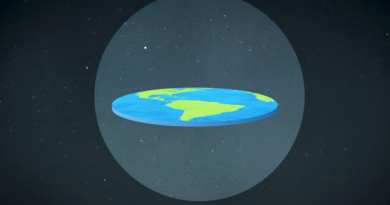How to argue with flat-earthers

Thinking that the Earth might be flat appears to have grown in popularity in recent years. Indeed, flat-earthers are gathering for their annual conference this weekend in Birmingham, just two miles from my own university in the United Kingdom.
But the Earth isn’t flat.
Unsurprisingly, this isn’t hard to prove. But as scads of YouTube videos demonstrate, these proofs fail to convince flat-earthers. A glance at the comments shows there’s still vitriolic disagreement in some quarters.
[embedded content]
Philosophy can explain why. Consider one, standard, flat-earth line: “Can you prove the world is round?” Maybe you point to the (often artificially assembled) photos of Earth from space. Or possibly you rely on the testimony of astronauts. The flat-earther knocks it all back. The standard of proof is higher, they say. You haven’t been to space. You haven’t seen the round earth.
Perhaps you then start to appeal to science. But unless you’re unusual, you probably don’t know all of the details of the scientific proofs. And even if you know the details, unless you’ve indulged existing flat-earth literature, you are unlikely — right here, right now — to be able to cogently, concisely, and comprehensively respond to the lengthy rebuttals flat-earthers will give to each and every scientific proof.
You could double down. Getting knee deep in the vloggersphere, you might learn the details of the scientific proofs as well as painstakingly spelling out each error in every flat-earther’s rebuttal.
[embedded content]
I recommend against doing that. I recommend letting philosophy do the work, specifically “epistemic contextualism.”
To understand what this is, we first must understand a familiar idea: context shift. Consider the sentence “I’m tall.” Surrounded by 5-year-olds at a rollercoaster park, the sentence is true — after all, I can get on all the rides and they can’t.
But at the try-outs for the Harlem Globetrotters, my measly 5’11” won’t cut it. So in that context, the sentence is false. Tallness is contextually sensitive. And it makes no sense to further ask whether I’m really tall or not. It only makes sense given a particular context.
Epistemic contextualists say that knowledge is the same. Imagine you’re transferring $10 to your daughter. You know her bank details. You tap them in. You send the money.
But now imagine you’re transferring $50,000. Doubt sets in. Do you really know her bank details? Are you sure? Sensibly, you phone her to double check. The contextualist says that in the first case, you know her bank details. In the second case, even though nothing about you has changed, the context has. And in that case, you don’t know the details.
Moving the goalposts
That said, I claim flat-earthers are doing a “Phoebe.” In one episode from the sitcom Friends, Phoebe and Ross argue about evolution. Ross piles on the evidence thick and fast. Finally, Phoebe loses her temper. Can he be so unbelievably arrogant, she asks, that he can’t admit the slightest chance that he might be wrong? Sheepishly, Ross agrees that there might be a chance. Suddenly, Phoebe has him — Ross’s admission destroys his worldview. He’s a paleontologist and, having admitted he can’t be sure about evolution, how can he “face the other science guys”?
Phoebe has (humorously) shifted context. Ross’s proof starts off relying on fossils in museums, books, and articles on evolutionary biology, and so on. But Phoebe moves him to a “skeptical context” in which if there’s a hint of doubt about something — any possibility that you might be wrong — then you don’t know it at all.
Philosophers are well acquainted with these skeptical contexts. For instance, you could be plugged into the Matrix and, if you were, then every belief you had would be false. By bringing your attention to that, I put us in a skeptical context within which we don’t know much of anything. Most people, though, ignore this possibility — most people assume themselves not to be in a skeptical context.
It’s now easy to see how Ross can face the other science guys. He does know evolution is true in most everyday contexts. It is only in Phoebe’s weird context that Ross does not know evolution is true.
Where flat-earthers go wrong
Flat-earthers are pulling the same trick. They’re right that you don’t know the Earth is round. But they’re only right in a context where testimonies of hundreds are disregarded, where widely accepted facts among the scientific community don’t count, where photographic evidence is inadmissible, and so on.
The flat-earther’s argument is framed in a context where you can’t set aside the possibility that there’s a pervading global conspiracy — albeit one which somehow intermittently leaves glaring errors which give them away. In that context, you don’t know the Earth is round. But in that context, nobody knows much at all and so this conclusion is simply unsurprising.
In the more everyday contexts that we care about, we can rely on testimony. We can rely on the fact that every educated physicist, cartographer, and geographer never pauses to think the earth might be flat. And we are correct to rely on these things. If it was incorrect, we’d never get treated at hospitals — for in a context where we can’t trust the established laws of physics, how could we trust the judgments of medical science?
So do you know whether the Earth is round? It turns out it depends on context. But in most regular contexts then, yes, you do. And that’s how to treat flat-earth arguments like this.
Don’t play the game where you pitch your (likely imperfect) knowledge of science against theirs; unless you’re a knowledgeable physicist who’s both a good teacher and armed with the patience of a saint, that’s a game that goes badly for both sides. Rather, try to explain that not being able to prove something with absolute certainty, right here and right now, is a nonstandard criterion for having to know something.
What I’ve not told you is how to convince a flat-earther that the Earth is round. I can’t promise any joy in that regard. Wedded to a “high-proof” context, and willing to believe only experiments they can conduct in their own backyard on a shoestring budget, their misunderstanding is likely unfixable.
Philosophers are used to that. Remember the skeptics who thought they knew nothing? Philosophers might be able to explain how we should resist skeptical arguments, and why you should think you know things, but they generally give up on convincing skeptics themselves.
Once you believe you don’t know anything, it’s hard to come back from that. Similarly, flat-earthers are so entrenched in the conspiracy theory, getting out again is a slog that they can only do for themselves.
Nikk Effingham is a senior lecturer in philosophy at the University of Birmingham. A version of this story was first published by The Conversation.
*** This article has been archived for your research. The original version from Vox.com can be found here ***


